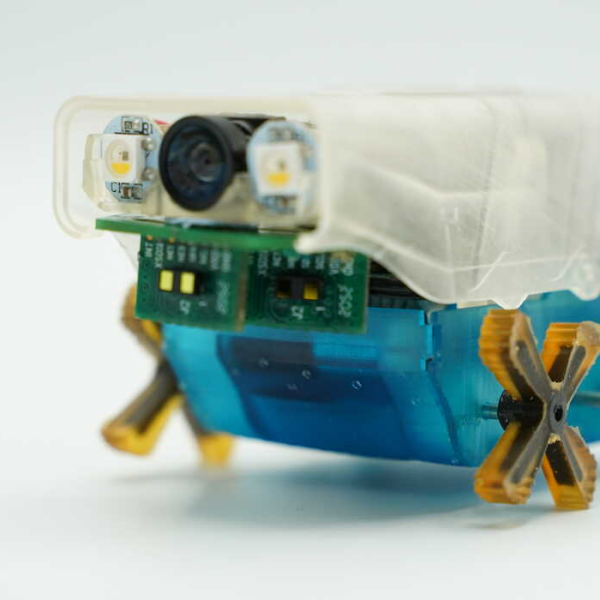Getting to play with technology is often the only justification a hacker needs to work on a build. But when your build helps someone, especially your own special-needs kid, hacking becomes a lot more that playing. That’s what’s behind this media player customized for the builder’s autistic son.
People generally know that the symptoms of autism cover a broad range of behaviors and characteristics that center around socialization and communication. But a big component of autism spectrum disorders is that kids often show very restricted interests. While [Alain Mauer] doesn’t go into his son [Scott]’s symptoms, our guess is that this media player is a way to engage his interests. The build came about when [Alain] was unable to find a commercially available media player that was simple enough for his son to operate and sturdy enough to put up with some abuse. A Raspberry Pi came to the rescue, along with the help of some custom piezo control buttons, a colorful case, and Shin Chan. The interface allows [Scott] to scroll through a menu of cartoons and get a preview before the big show. [Scott] is all smiles in the video below, and we’ll bet [Alain] is too.
Pi-based media player builds are a dime a dozen on Hackaday, but one that helps kids with autism is pretty special. The fact that we’ve only featured a few projects aimed at autistics, like this 2015 Hackaday Prize entry, is surprising. Maybe you can come up with something like [Alain]’s build for the 2016 Hackaday Prize.





















Autism is considered a scale that we are all on from the average to those who are perhaps “different”. It’s not believed to be a “disorder”.
Given the rise in detection rates, it’ll soon be “neurotypicalism” that will be the “disorder”. ;-)
We are slowly taking over the world, to quote Temple Grandin: “What would happen if the autism gene was eliminated from the gene pool? You would have a bunch of people standing around in a cave, chatting and socializing and not getting anything done.”
Are you seriously calling all people who get stuff done: autistic?
Sure, hide behind ‘autism gene’ != autistic or something like that, but that’s how you come across.
Quote: “Scientists and mathematicians test higher on autism spectrum, says Cambridge University”
Ref: http://www.telegraph.co.uk/news/science/science-news/11973110/Scientists-and-mathematicians-test-higher-on-autism-spectrum-says-Cambridge-University.html
That’s a pretty weak citation. The ASQ is used to determine if there are signs of autism in someone not to diagnose; basically pre-screening. Also the word spectrum is misleading in this case, it is simply a carryover from the innacurate (or more specifically incomplete) term “Autism Spectrum Disorder” and is not reflective of the quotient itself. You don’t call it intelligence spectrum quotient as intelligence is not a one dimensional thing.
Also the levels on the ASQ cited in the study you linked are low enough to almost completely rule out the possibility of a diagnosis.
Saying everyone is “A little bit autistic” is a lot like saying everyone is “a little bit asthmatic”, a little bit blind”, “a little bit deaf” or “a little bit alzheimer’s” sure very few if anyone has 100% lung, vision, hearing or memory function; yet you probably wouldn’t say such things. Also all those things are not 1 dimensional issues. When testing and treating a person for poor vision you don’t just test at one distance, in one lighting condition. When testing lung function you don’t only test capacity. When testing and treating hearing problems you don’t just test a person’s ability to detect a single frequency with no background noise. When testing memory function you don’t just test short term memory of words in an order.
But sure, everyone is a little bit autistic and it is a simple one dimensional spectrum that affects everyone the same and only varies in intensity.
The irony is that about half of people in the ASD are not intelligent (IQ < 70).
Studies on children show that about 55% are downright retarded, 14% are below normal, 28% are of normal intelligence, and only 3% of people that fall in the ASD are above normal (115+).
In contrast, 68% of the population in general falls within the normal group (85-115 points), and 16% are above-normal. The idea that autists are super-intelligent "achievers" is a popular myth – in reality and overall, autists are less intelligent than the general population. Many are very difficult to deal with and prone to violent and unpredictable compulsive behaviour.
So the idea that scientists and mathematicians with high IQs were actually autistic is implausible. They may have properties similiar to autism, but that is likely to have nothing to do with autism, and can be simply an aquired characteristic due to dedication to science in general.
Steven, I think that’s true. You can learn a logical, specific, mode of thinking. Science and computer programming both encourage it. It might be similar to the narrow, obsessive focus many autists have. But to us it’s an ability, not a limitation. Although it can be a strong influence, to the point of annoying friends and family…
@Dax, you didn’t provide a source for your figures so it is kind of hard to refute them, but based on their nature and how you’ve presented them I can make some good assumptions at some of the problems with them.
First they are probably outdated, the diagnostic criteria for ASD were recently altered to include what used to be called Aspergers Syndrome.
Second I think you mean to say “The AS” ASD is short for autism spectrum disorder, something you would know if you actually knew more than could be obtained with a quick google, you’re really not doing much for you’re credibility with mistakes like that.
“Many are prone to violent and…” Got a citation, how many? Are you aware that many of these violent behaviours are provoked by mistreatement and abuse (seriously, adversive elecroshock is still used, how is that not abuse?).
“Retarded” wow, another thing showing you are incredibly outdated and lack credibility, the term is developementally delayed.
Temple Grandin, meet Christian Weston Chandler. Didn’t see that coming, did she?
Do you have a credible citation for this “everyone is on the Autistic scale” and how about something to indicate this one dimensional scale you describe?
Where did you get the idea that everyone is on an autistic scale? Got a credible citation for that?
And how about this one dimensional scale you describe that goes from “avrage” to whatever you’re calling it? Got a citation that describes such a scale?
Is there an echo in here?
Would you like a citation that suggests that there is?
I’m not on it. It’s not meaningful to say we’re all on a scale, where nearly everybody is at zero. Unless by “we” you mean Hackaday commentors.
It’s a disorder. Their brains don’t work properly. It’s a medical thing, almost certainly genetic, that affects the brain.
One could easily suggest the reverse is true, allistic people are overdependent on body language, obsessed with communicating verbally and have severely muted senses. Allistic people often get upset if someone doesn’t look at their eyes when they speak or doesn’t “know” what they’re feeling before they say it. They can have trouble understanding and recognizing patterns. Allistic people tend to lack the ability to focus on a specific topic for extended periods of time.
Matter of perspective. Sure autistic people often have difficulties that seem extreme, but most of the difficulties stem from working differently than typical brains which the entirety of society and technology has adapted to.
That’s a bit disingenuous, because autistic people don’t have the ability to “focus on a specific topic for extended periods of time”. They usually can only focus on ONE PARTICULAR topic, and never stop talking about it, even when inappropriate and unproductive, sometimes to the point of neglecting other topics. An autistic person can for example feel it more important to play with my little ponies than take care of their personal hygiene.
That’s a disability, not an ability, even in comparison to the short attention span of the average person.
Hyperbole and sarcasm are things… Also if you are going to challenge a statement someone makes do them the courtesy of challenging the entire post instead of nitpicking, that is bad form and increases the readers perception of your (already massive (see earlier)) lack of credibility.
We’re not “allistic”, we’re “normal”, or “healthy”. I’m the last person to think normal always equals good. But you’re looking at this from (I presume) an autistic perspective. The autism itself limits your way of thinking. It’s the same way many autistics on the Internet seem to think we tar them with the same brush, that one autistic person’s misbehaviour makes us judge them all the same way. Neurotypical people don’t think in that stereotypical way.
I wouldn’t get upset if someone avoided eye contact, but I would think it was weird. If I knew they had autism I’d know that it’s a symptom of that, so I’d keep that in mind and not judge them for it. Not making eye contact is also an indicator of dishonesty, since eye contact creates some sort of subconscious communication between people. Autistic people are often bad at reading facial expression, for the rest of us, it’s a useful way of telling what someone’s thinking, despite what they’re saying.
This is all something we evolved, there’s a lot more to communication than the verbal. Autistic people are missing it, it’s a faculty they don’t have. That’s a disadvantage.
Just because you have autism doesn’t make you a bad or less worthwhile person. But it’s not simply a “difference”, as if it were a preference or matter of choice. The “autistic pride” movement has taken on a few SJW tendencies, normally preferred by people with some sort of personality problem. Don’t swallow your own bullshit. It’s a disability, that you can cope with, with decent training. But you’re not some sort of evolutionary superman, some next step to a future cyber-consciousness.
Allistic is another word for normal, more accurate and specific to indicate normal by way of not having autism.
My previous comment was hyperbole. However I will address some of your points:
“but I would think [a lack of eye contact] was weird.”
So you would be bothered by it, just not as much as someone with more severe allism.
“Autistic people are missing [the ability to understand non verbal communication], it’s a faculty they don’t have”
Some yes, but not all, while this is part of the diagnostic criteria and a symptom it is not universal or required for a diagnosis.
“But it’s not simply a “difference””
True, the message I want to convey is that a large portion of autism is “differences” and not “problems” there are a lot of problems and deficiencies that some autistic people have. However it is counter productive to look at every symptom and trait that way.
“that you can cope with, with decent training”
As long as you’re not talking about ABA and similar training, I am with you.
“But you’re not some sort of evolutionary superman, some next step to a future cyber-consciousness.”
Someone has been watching too much big bang theory, I don’t think many people with autism think that, you certainly read way too much into what I said.
Oh yes it is, and using it (a person’s disability) as a justification to harass them is unlawful in most of the first world. Where do you come from?
While I already like the project per se, I would like to direct your attention to the piezo buttons mentioned in the description. That is a really clever hack IMO. I have not seen anything like it and it seems to be an easy and cheap way to build robust and waterproof buttons without having to shell out 20€ per button for something IP67.
One thing I observe, the text “2015 Hackaday Prize entry” seems to link to the same YouTube video as the one shown below. Did this project get submitted last year too?
http://hackaday.com/2015/09/10/hackaday-prize-semifinalist-a-device-for-autism-and-pomodoros/
I love that he has Shin-chan on it. Even though Shin-chan is a much more….adult oriented cartoon.
Oh god that beeping sound it makes x.x
I couldn’t help but cringe, why such a harsh sound?
Feedback, audio feedback for the kid. Else, did the display my awesome dad mad eactualy work?
It was the first buzzer i had found, I already ordered another one. Or maybe I will replace it with a pager motor
Pretty much color for autism isnt it?
Sensory processing issues manifest differently in different people.
Scott has no problem with colors, but big problems with loud places
In case you haven’t already, check out noise reducing (not blocking) ear plugs. There are various types which allow only some noise through, even some that specifically help eliminate frequencies that tend to be higher and lower than human speech. You can also buy active plugs which are headphones with a built in ambient microphone.
These options are often preferred to noise cancelling headphones as they are less visible, don’t block communication and are less likely to develop an unhealthy dependency.
A great idea is to have both, on a trip to a loud place start with the plugs and when needed switch to the headphones. It is best to let the person using these things to decide for themselves when to use what solution. But you should also encourage moderation in the use of these tools. Some people may be dependant on these things to be able to be in a loud place, that is certainly better than not being able to be there!
As mentioned previously, it can manifest differently. For all we know his kid likes vibrant colors — I can only assume he put this together knowing exactly what would and wouldn’t work.
In the Year 2037 Transgender Autistic traverses Black hole and returns.
Nope not even once.
Puting the comments back on track, great project Alain. I have an autistic and was looking at building something very similar. This will be a great help in getting my project going.
“An autistic”? Please tell me you accidentally left a word out!
Yes,sorry I wasn’t being rude, it was just my fat fingers on a little phone, I missed the word “son”.
Look at the size of that smile, the project is a wonderful success!
Beautiful work. I tend to like primary colors and soft sounds.
Yeah, it actually looks great, well beyond something designed without form in mind!